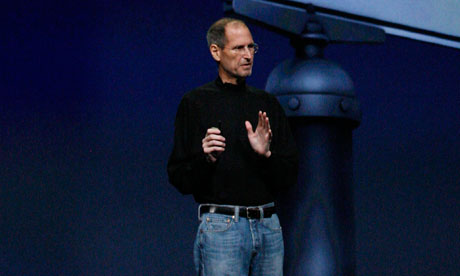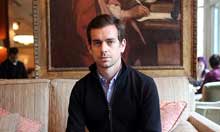Key figures whose technological influence is changing the way we use the internet and live our lives

Steve Jobs will be remembered for his appearances on stage enthusing about Apple products. Photograph: Monica M Davey/EPA
Steve Jobs, technology
The visionary behind Apple, which changed the way we use computers
This is how he will be remembered: as a lone figure on the stage of the Moscone Centre in San Francisco, dressed in black jeans and turtleneck shirt, holding an Apple product and enthusing about it. The words come from the heart of a man who cared more about design than anyone else. Because Apple, the company he co-founded with Steve Wozniak in 1976, was a computer company, most of the timelines put Steve Jobs alongside Bill Gates, who co-founded Microsoft. But this is to underestimate him. Jobs's great contribution was recognising that computers would become consumer products, and that meant they had to be attractive and easy to use. It was that instinct that led him to prowl streets and department stores in the early 1980s looking for design metaphors for the original Apple Macintosh. It was also the instinct that led him to "lift" the mouse-driven graphical user interface developed at Xerox's Palo Alto research centre and implement it in a computer aimed at the average consumer. Jobs's other great insight was that computers would become vehicles for people to "consume" multimedia content. He started with music at the time when MP3 compression technology and illicit file-sharing were dismantling the business model of the CD-based recording industry. Apple came up with iTunes, enabling non-techies to get music off CDs and on to hard drives. A few months later, Jobs unveiled the iPod. Having sprung the trap on record companies, Jobs then offered them a way out: if they licensed their music to him, Apple would sell it through the iTunes store. Within a year it had sold 70m songs.
Mark Zuckerberg, internet
The Harvard student revolutionised social networking with Facebook
A child programming prodigy, keen fencer and fan of the Iliad, Zuckerberg launched Facebook from his dorm room at Harvard in 2004. Zuckerberg and three friends were inspired by school photo directories in the US, and created an exclusive portal for social self-representation. Initially just for Harvardians, they rolled the service out to other top universities before opening to the public in 2006. Facebook beat MySpace, Bebo and others in the battle of the social network sites. Zuckerberg's key insight was to realise how much privacy people were willing to give away for free. Whatever the 27-year-old Zuckerberg touches turns to gold. Facebook now claims 750 million users, and Zuckerberg's net worth is estimated at $13.5bn, making him the 52nd richest person in the world. Even David Fincher's The Social Network, which documented the company's serial litigations, won three Oscars.
Elon Musk, technology
The entrepreneur created the first electric car with the potential for mass production
Elon Musk is best-known for being co-founder of PayPal, the online payment service that has monopolised internet commerce, but he has also designed a viable electric car and a putative successor to the space shuttle. The South African-born engineer and entrepreneur is deeply concerned with global warming. He set up Tesla Motors to design the first mass-market electric car of the modern era. Son of an engineer father and model mother, Musk taught himself computer programming aged 10, and a few years later sold a space game he had created. He moved to Canada to avoid being drafted into the South African military, then took degrees in business and physics. Musk made his first fortune creating online publishing software for newspapers. He then ventured into the world of online payments, buying and refining PayPal alongside other Palo Alto luminaries. PayPal was sold to eBay for $1.5bn in 2002. His other passion is space exploration. His firm SpaceX develops low-cost launch vehicles.
Jack Dorsey, internet
Creator of Twitter
 Jack Dorsey, co-founder of Twitter. Photograph: Bloomberg via Getty
Jack Dorsey, co-founder of Twitter. Photograph: Bloomberg via GettyThe 34-year-old Jack Dorsey, the co-founder and executive chairman of Twitter, has been dubbed the "James Franco of the internet". Partly, one imagines, this is because of his good looks and sense of style – not something usually associated with computer geeks. The brainchild of Dorsey, Biz Stone and Evan Williams, Twitter has only been around for five years but has already reshaped the digital landscape and now boasts more than 200 million users. It has flouted super-injunctions and was instrumental in the Arab spring revolutions. In 2010 Dorsey launched Square, an application that allows users in the US to accept credit card payments through their mobile phones. Square has been valued at $1bn; Twitter at $3.7bn. Dorsey grew up in St Louis, Missouri, and as a child was obsessed with city maps and the routes taken by taxis, couriers and police cars. After dropping out of New York University, he became interested in the way taxi firms convey locations via radio – from this, the idea for Twitter was born. Is there any ambition he has left unfulfilled? Yes. He has announced his desire to become the mayor of New York – one day.
Anonymous, technology
Influential hacking group
Born from the shadowy 4chan network, Anonymous is a collaborative "internet gathering" which originally formed to protest against Scientology. They describe themselves as having "a decentralised command structure that operates on ideas rather than directors", which allows them to effect civil disobedience through online channels. Since coming together in the 00s, that's allowed them to influence some of the biggest news stories of recent years, from WikiLeaks to the Arab spring.
Sean Parker, technology
Hacker-turned-entrepreneur
At 16, Parker was sentenced to community service for infiltrating the software of multinational corporations. He grew up to play a crucial role in two of the most revolutionary companies in the history of the internet. Parker was an early employee of Napster, the music filesharing service that paved the way for free download culture, and then became Facebook's first president. Those two ventures have made him a billionaire and someone who, as the entrepreneur Peter Thiel recently asserted, "is really changing the world and turning the wheel of history".
Tim Berners-Lee, technology
Visionary behind the world wide web
A physicist and computer scientist, Berners-Lee had the idea in 1989 while working at the European Organisation for Nuclear Research of populating the nascent internet with hypertext. These are pages of text with highlighted links that can be clicked on to access other relevant pages. Thus he launched the online world we have today. He wrote the first web client and server in 1990 and dubbed this proposal the world wide web. Berners-Lee is the director of the World Wide Web Consortium, which oversees the web's standards and development. "The web, as I envisaged it, we have not seen yet," he says. "The future is still so much bigger than the past."
Gregg Zehr, technology
The e-book pioneer
Gregg Zehr led the Amazon hardware offshoot Lab126 that developed the Kindle. Zehr had worked at Palm, Linux and Apple before taking on the role. When asked to join Amazon he responded, "Why should I?" "To change the world," came the reply. Three years later, in 2007, his team delivered the first Kindle. Earlier this year Amazon announced that it now sells more Kindle editions of books than paperbacks.
Robin Li, internet
The man behind China's answer to Google
The child of Shanxi factory workers, Robin Li co-founded Baidu, China's number one search engine. Educated in Beijing and the US, Li returned to China after working for American tech companies and set up the search engine in 2000. Baidu has been criticised for facilitating net piracy and kowtowing to Beijing's demands for censorship, but when the firm went public on the Nasdaq in 2005 its value quadrupled in 24 hours. Baidu now has 80% of Chinese market share and is the third biggest independent search engine in the world. Li is the richest man in China.
Ben Lavender
The man who created the iPlayer
The BBC led the way in the integrated media player market when it launched the iPlayer in 2007, and the original idea and development is down to Lavender. Despite early problems, 3.5m programmes were streamed or downloaded in the first three weeks. By April 2008, the iPlayer accounted for 5% of all UK web traffic. He now works for DVD rental company Lovefilm.

Nenhum comentário:
Postar um comentário